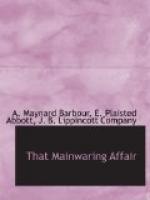With great precision, Hobson adjusted a pair of eyeglasses and proceeded to scrutinize the writing closely. “Well,” he remarked, at length, very deliberately, “I do not deny that to be my writing, nor am I prepared to positively affirm that it is such. The fact is, my chirography varies so much from time to time that I often find it difficult for me to verify my own signatures.”
“Here are some papers which may assist the gentleman, and may be of some use to the court,” said a deep voice with rich, musical inflections, but slightly tinged with sarcasm, and the English attorney handed a small package to Mr. Sutherland. “They contain,” he added, “some specimens of the witness’s chirography of about the same date as the will.”
“The writing in both cases is identical,” said Mr. Sutherland, as, having examined the papers, he showed them to Hobson, but a glance at their contents seemed rather to confuse the witness than otherwise, for he remained silent.
“Do you acknowledge these letters to be of your writing?” inquired the attorney.
“I do, sir; and I have no doubt but that the other is my writing also.”
“You acknowledge this, then, as the will which you wrote at the dictation of Ralph Maxwell Mainwaring the night before his death?”
“I believe it is, sir.”
“Mr. Hobson, why was this will not make public following Mr. Mainwaring’s death and burial?”
“On the day after his death, I gave it into the keeping of his son, Hugh Mainwaring, at his own request, and he afterwards gave me to understand that it was lost.”
“And you were paid for keeping silent as to the existence of such a will, were you not?”
“I may have been,” the witness replied, with a calmness born of desperation.
“That is sufficient for the present.”
A few moments followed in which the attorneys consulted together, while comments in tones of subdued excitement and expectancy were exchanged among the crowd. Ralph Mainwaring had sat with darkening face throughout the testimony thus far; now he remarked to Mr. Whitney, with a bitter sneer,-
“Fine witnesses! A beggarly shyster whose oath is worthless, and an imbecile old servant, who could be bought for a half-crown!”
Young Mainwaring turned upon his father a look of indignant surprise. “Governor,” he said, “it would not be well for you if either old James Wilson or his son heard that remark of yours!”
“It will be well for you to attend to your own business and keep your mouth shut!” responded his father, angrily.
Beneath the calm exterior which the young man preserved, the old Mainwaring blood was now fast rising, but he made no reply, for at that instant Mr. Sutherland announced the name of the next witness:
“Harold Scott Mainwaring!”
There was a sudden hush throughout the court-room, broken an instant later by a low murmur of mingled astonishment, incredulity, and wonder as the private secretary rose and walked towards the witness stand. A few comments reached his ears, but he seemed unconscious of them, and, having taken his place, turned towards the audience a face cold and impassive, inscrutable to his enemies, who could read nothing of the conflicting emotions beneath that calm, immobile surface.




